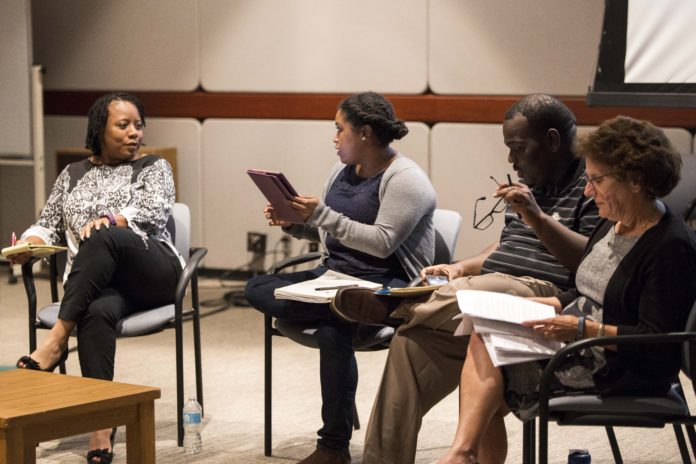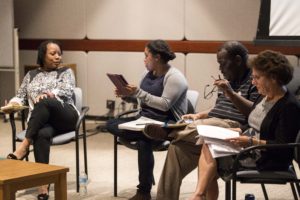

Donald Trump’s 2016 election strategy has unearthed the racial division of the nation, energizing rural, uneducated, and white supporters, as described by Assistant Professor of Africana Studies, Emmitt Riley, to an audience of 80 late Tuesday afternoon.
“He (Trump) appeals to the bigotry of many Americans,” Riley said.
Riley was one of the four DePauw University professors who spoke about race and gender in the election. The gathering was sponsored by Women's, Gender and Sexuality Studies.
“His answer to healing race relations in the nation, it was law and order. That was code, that was a dog whistle for lock the negros up who are protesting for police brutality,” said Riley when explaining how Trump appeals to the racial attitudes of his supporters. He further explained that 90 percent of Trump supporters believe blacks should work harder, and 92 percent believe blacks should build themselves up higher professionally without any special treatment.
“When we look at levels of racial resentment, it’s off the charts,” he explained.
This idea of the divide between black and white attitudes was addressed by Clarissa Peterson, professor of political science.
“Maybe we are as divided as they’re exploiting right now,” points out Peterson in an attempt to answer whether or not black and whites are truly separated.
She further explains that data has shown 43 percent of white people describe black people as lazy. However when it came to using the term lazy to describe white people, only about 6.3 percent of whites agreed. “There is something seriously wrong if we have different expectations and descriptions for people based on their race,” Peterson said.
Peterson also related the differing reality of blacks and whites to voters’ attitudes towards Trump. Only about 40 percent of whites dislike Trump, compared to over 63 percent of blacks. “Maybe that is why we can end up in a situation where we have candidates that go after people in different ways and really aren’t that interested in trying to court both groups, at least the Trump campaign doesn’t seem as interested in courting both groups,” Peterson said.
Whereas Peterson and Riley honed in on race issues revolving the election, Leigh-Anne Goins, Professor of Women's, Gender, and Sexuality Studies, brought up the problem of gender.
Goins stated that Hillary is a victim of sexism in which she is criticized for her lack of femininity and inability to play her proper role as a woman. Hillary is often told that she is too aggressive, and needs to be more soft. She has to perform a constant balancing act, Goins explains, and the media has very specific frames by which we interact or understand certain people.
Not only does Goins believe Hillary is criticized for her lack of conformity to gender roles, but she also discusses how the nation questions her authenticity. “She’s constantly bending and folding and moving herself into a pretzel in order to be accepted and now here we are in 2016 and we’re like ‘oh you're not authentic,’” said Goins.
Goins gave an example of Hilary “folding” in describing Hillary’s law school experience. Men often told Hillary that she should not be attending law school because she was taking up a spot that a man could have filled, as a result Hillary became more tough and masculine to survive. “Yet since she has prevailed, and we have specific views about gender, we hold her accountable to being a woman and we say you shouldn't behave like this,” Goins said.
“We are ushering into a new era of ignorance,” said Miranda Spivack, Pulliam Distinguished Visiting Professor of Journalism, while describing this year's election.
Spivack explained how racism is not new, especially in the Republican Party. However, other politicians, she argues, unlike Trump, were able to hide their racist views. “This is a culmination of years and years of racist dog whistles, and it comes in the form of Trump who is a media creation,” Spivack said.
She also puts the blame on the media and the executives making the decisions. Which happens to be a majority of white men. Spivack explains that during her duration at the Washington Post
, she experienced an exodus of older women and African Americans.
“It’s a very limited world view,” said Spivack, when arguing that a media ran by like-minded people prevents diversity in beliefs and worldly issues.
Freshman Abby Surrisi believes that the panel was effective in touching on issues in a new light.
“I thought it was a really diverse panel, the thoughts that people had were all really diverse which I thought was good because it gave everyone a new insight and I’m glad I came,” Surrisi said.
Another student found the conversation relevant to recent racial issues on campus. “ I think they echoed a lot of what people on campus really wanted to hear,” said freshman Caleb Anderson.
The panel hopes the event encouraged students to become engaged in democracy and to be active citizens. Riley stated that he believes events like this are important because it opens opportunity for dialogue and pushes academics to make things relatable, especially with recent demonstrations and racial incidents on campus.
“Some of the incidences I think we see occurring on campus, I think are a direct result of these high polarizing areas in which we live in as a result of all the issues we’ve talked about today,” Riley said, “Every single person at the university should be valued and be respected for who they are and we should certainly condemn any acts of open racism whenever it occurs.”
--Correction: The original article incorrectly stated, "Spivack explains that during her duration at the New York Times." She worked for the Washington Post.
